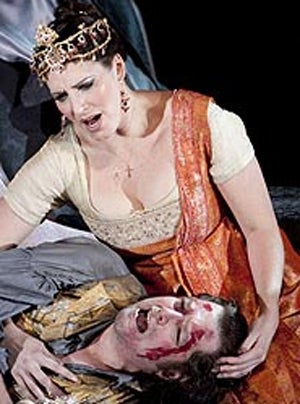Tosca, Coliseum, London<br/>After Life, Barbican, London
Malfitano's 'Tosca' does not make a case for the diva as director

Your support helps us to tell the story
From reproductive rights to climate change to Big Tech, The Independent is on the ground when the story is developing. Whether it's investigating the financials of Elon Musk's pro-Trump PAC or producing our latest documentary, 'The A Word', which shines a light on the American women fighting for reproductive rights, we know how important it is to parse out the facts from the messaging.
At such a critical moment in US history, we need reporters on the ground. Your donation allows us to keep sending journalists to speak to both sides of the story.
The Independent is trusted by Americans across the entire political spectrum. And unlike many other quality news outlets, we choose not to lock Americans out of our reporting and analysis with paywalls. We believe quality journalism should be available to everyone, paid for by those who can afford it.
Your support makes all the difference.English National Opera's celebrity internship scheme continues with Catherine Malfitano's Tosca. Can one diva bring about the demise of "directors' opera"? Apparently not.
While Edward Gardner and the orchestra produce a thrilling concentrate of venality, ardour and terror, what replaces David McVicar's glamorous brute of a 2002 production is frumpy naturalism, with wobbly pillars for the church of Sant'Andrea della Valle and a Nasa-style starscape for the Castel Sant'Angelo emergency exit (sets by Frank Philipp Schlössmann).
Tosca directs Tosca is what we're meant to think, though Tosca directs Tosca is more accurate. Malfitano's performing experience is most obviously employed in guiding Amanda Echalaz, who presents a more fragile, less sexually confident Tosca than she did in Stephen Barlow's bold updating for Opera Holland Park. More is lost than is gained. Though Malfitano frames the aria "Vissi d'arte" in an intimate pool of light, with Echalaz pleading directly to the audience, the jealousy that seals Cavaradossi's (Julian Gavin) fate has no playfulness or self-awareness. It is hard to imagine Gavin's reserved painter untidying her hair with his kisses. Theirs is a lights-out, teeth-brushed affair, not a violent passion between a capricious actress and a Bonapartist intellectual.
In Malfitano's production the characters are truer to Sardou's play than Puccini's opera, which skilfully insinuates layers of ambiguity. That Tosca surrenders her body to the void, falling backwards from the ramparts with her gaze fixed on the corpse of her lover, is the only innovation of note. Elsewhere, this is Zeffirelli-lite: pure hokum in the choirboys' dance of Act I and the prelude to Act III. Malfitano dismisses the notion that Tosca is attracted to Scarpia (Anthony Michaels-Moore) as "a male fantasy". Sadly, she seems also to have dismissed the idea that the opera is set in a city where brutality and corruption are barely masked by the clouds of incense, or that Scarpia might be more threatening than, say, Peter Mandelson in a skittish mood on Newsnight. So what's for dinner at the Palazzo Farnese? I've always had the baron as a manzo al barolo man but no, a bowl of soup is enough to set him up for an evening of rape and torture. Silky and slippery, Michaels-Moore isn't the sin-glutted carnivore we need, nor is there enough bass in his baritone.
This, then, is "singers' opera": a style in which no performer hinders the arm movements of another, and henchmen cluster in formation like entrants in a Dick Dastardly lookalike competition. The narrowness of Malfitano's vision would matter less were it not diluting an orchestral triumph. Gardner's response to this glorious score is both visceral and highly intellectual, perfumed with blood, roses and the acrid tang of cordite. Echalaz remains the Tosca of her generation, with a tone that trembles with candour, but I miss the spunk and sophistication she brought to the role two years ago. Gavin's earnest Cavaradossi lacks beauty but fills the space. All in all, this Tosca is considerably weaker than its predecessor, one of McVicar's most disciplined and musically responsive stagings. Better to spend the money on a new translation, perhaps one in which Cavaradossi's pet name for Tosca is a little sexier than "dear".
Best known in this country for the electronic interludes in Louis Andriessen's Writing to Vermeer and Henze's Phaedra, Michel van der Aa adapted his opera After Life from Hirokazu Koreeda's film. In a clearing-house between life and death, Ilana (Margriet van Reisen), Byrna (Helena Rasker) and Mr Walter (Richard Suart) are asked to choose one memory from their lives, with which they will then spend eternity. Watched over by the Chief (Claron McFadden), Aiden (Roderick Williams) and Sarah (Yvette Bonner), they sift through a garage sale of worn sofas, ancient radiograms, faded kites and filing cabinets in counterpoint to a series of filmed interviews in which two elderly women, a middle-aged man, and a young boy recall their most poignant memories. The subject matter is naturally fascinating, though Van der Aa's documentary footage is more moving and subtle than his score, which pitches stilted speech rhythms over agitated figures for strings and harpsichord. A fine performance from the singers and the impeccable Asko/Schönberg ensemble did little to dispel the impression that life is sometimes more poetic than art.
'Tosca' (0871 911 0200) to 10 July
Next Week:
Anna Picard packs a picnic for Glyndebourne's first Billy Budd – and Michael Grandage's first time directing opera
Join our commenting forum
Join thought-provoking conversations, follow other Independent readers and see their replies
Comments